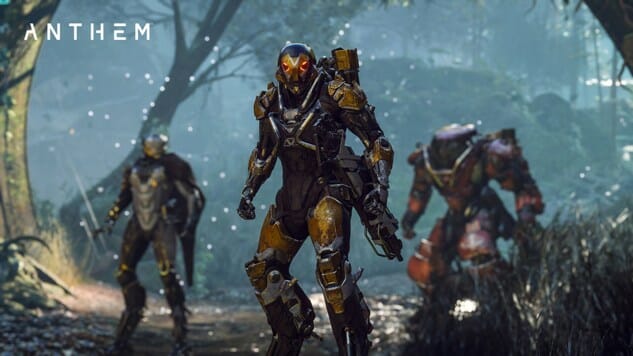
My first BioWare game was Knights of the Old Republic. At the time, the most RPG experience I’d had was with Final Fantasy games on the Playstation, and while I was a fan of those, they weren’t, you know, Star Wars—the series I was and had been obsessed with since I could recognize the visage of Darth Vader.
Knights of the Old Republic was BioWare’s sixth title, and followed in the footsteps of the previous titles of the studio, emphasizing character-driven storytelling and rich, quest-filled worlds that rewarded players for exploring and poking at the many interlocking systems in each area.
A pattern was emerging, something that would define the studio tentpole releases for years to come. BioWare’s output has become synonymous with this house style—character-rich worlds with an emphasis on dialogue and narrative choice by the player. It’s what brought life to one of my favorite series, Mass Effect, and, ironically, that same series might be the last of that particular design lineage.
Earlier this year, BioWare confirmed that the next entry in the Dragon Age series will include “live game” elements—presumably similar to those seen in MMOs or MMO-like games such as Destiny 2 or BioWare’s upcoming Anthem.
The move breaks from a long history of BioWare’s most critically lauded titles being chiefly focused on the single-player experience, but it’s directly in line with how Electronic Arts (the future publisher of both Dragon Age 4 and Anthem) has publicly embraced microtransactions and subscription models for games.
It’s no secret that Electronic Arts has a long history of acquiring game studios, shaping their releases to bend toward EA profit motives, and, if the studio fails to meet sales expectations, quietly folding it or merging it with another studio—the latest example of this a mere four months ago.
Put simply, the way that Electronic Arts manages itself and its studios is detrimental to everything but its bottom line. If Dragon Age 4 fails to meet sales expectations, and I worry that it might, the failure will undoubtedly come down on the heads of those at the BioWare studios that did the chief work on the project. Their jobs will be in danger, and it’s likely the studio will be folded. This has precedent—not just with other studios, but with BioWare itself. After the critical and sales disappointment of Mass Effect: Andromeda, BioWare’s Montreal studio was “absorbed” by EA Motive, the primary development team behind controversial lootbox cash cow Star Wars: Battlefront II.
The logic behind adding “live elements” to a game is relatively simple from the publisher’s perspective. Since the goal here is not, necessarily, to create a “good” game, but to create a game that sells well, adding in methods to pull extra money from players after the initial sale feels like a no-brainer. Sales models that focus on not just the $60 upfront purchase but the continued line of purchases via microtransactions and gameplay will bring more money in, with (hypothetically) less work on the development side.
The problem is, as I’ve brought up in previous articles, those increases in profit for EA don’t necessarily trickle down to the workers in the studio. So while a game individually might be pulling in more profit via microtransactions, this rarely has any correlation to the quality of the title or the compensation passed on to developers.
At least at first glance, what we’ve seen of Anthem leads me to believe the game is going to take some not-so-subtle mechanical inspiration from Bungie’s Destiny, a squad-based, open-world online multiplayer experience with quests and first-person shooting and multiplayer social hubs, as well as in-fiction lootboxes and “global events” that involve a large swath of players. To say it’s not following the template would be ignorant.
Truthfully, there’s nothing wrong with the template—plenty of players enjoy Destiny, plenty of players will undoubtedly enjoy Anthem. The problem here is not so much in the design, but in the reverberations that this will have on a studio’s house style now that they’ve been acquired by a publisher whose goals differ on such an extreme scale.
BioWare’s games have never been known for their multiplayer. While it hasn’t been nonexistent, it’s clear that in their time with Electronic Arts, the focus has shifted away from the character and story-focused roots of the studio (the aspects of their games most fondly remembered in the critical sphere) and toward guaranteed income generation via microtransactions and retaining player interest over time.
A game whose sole purpose is to “keep me playing” is not a hook in and of itself. What I loved so much about earlier BioWare titles was their commitment to a world that had a beginning and end, and the stories told within that structure. Losing that structure in favor of a “forever game” in the mold of Destiny would be a loss for more than just a studio, but for the landscape that BioWare helped shape.
Dante Douglas is a writer, poet and game developer. You can find him on Twitter at @videodante.